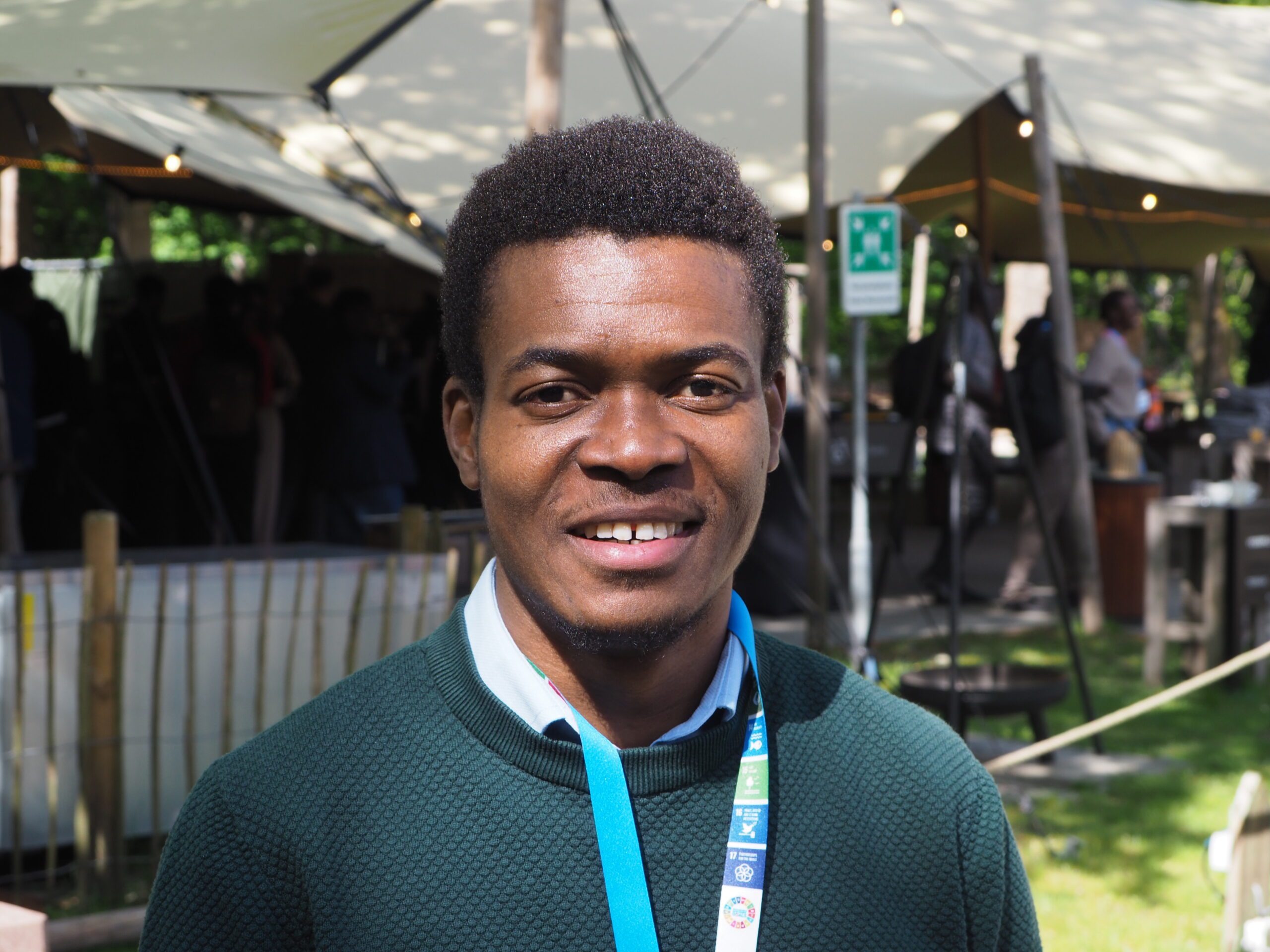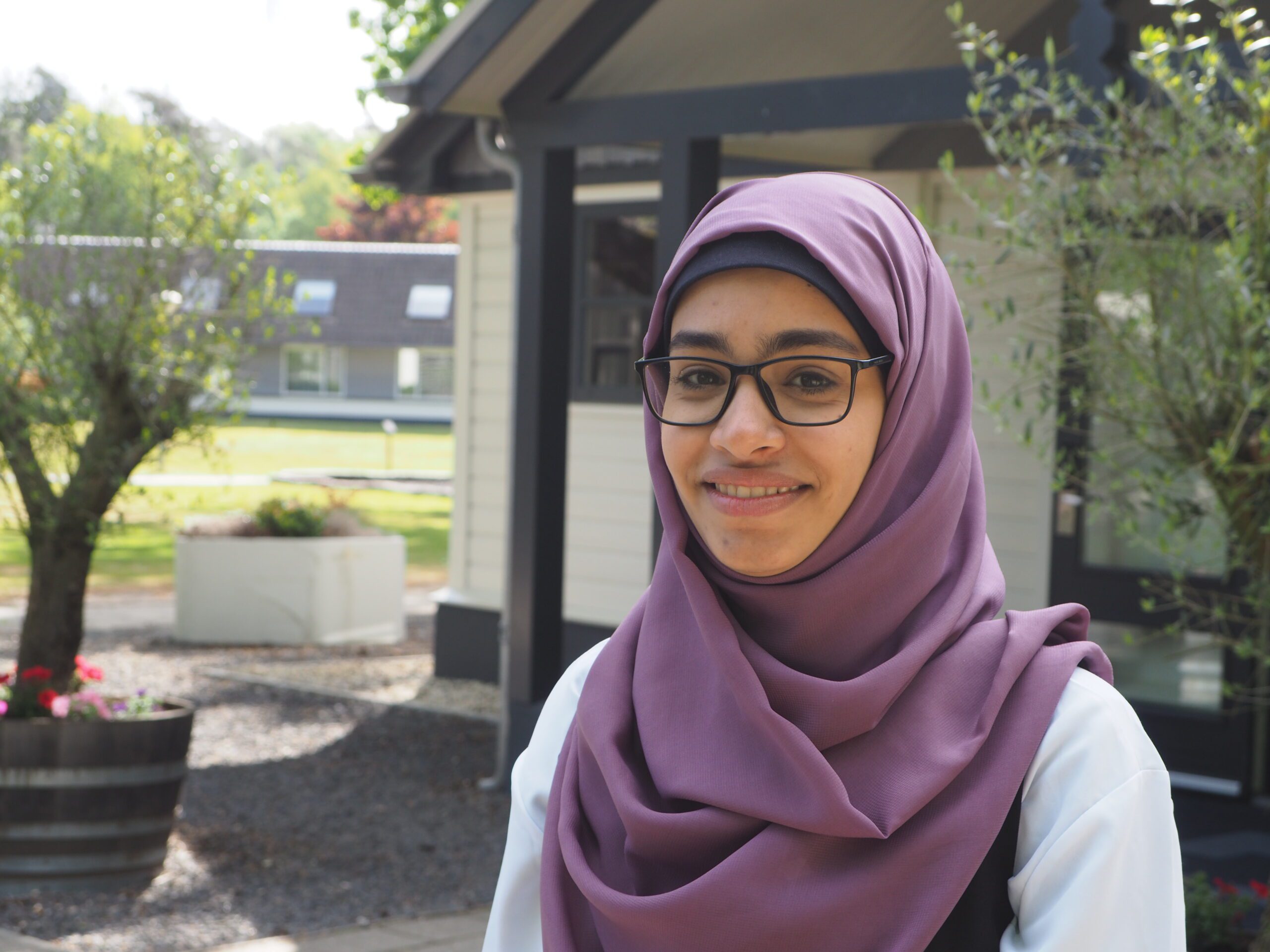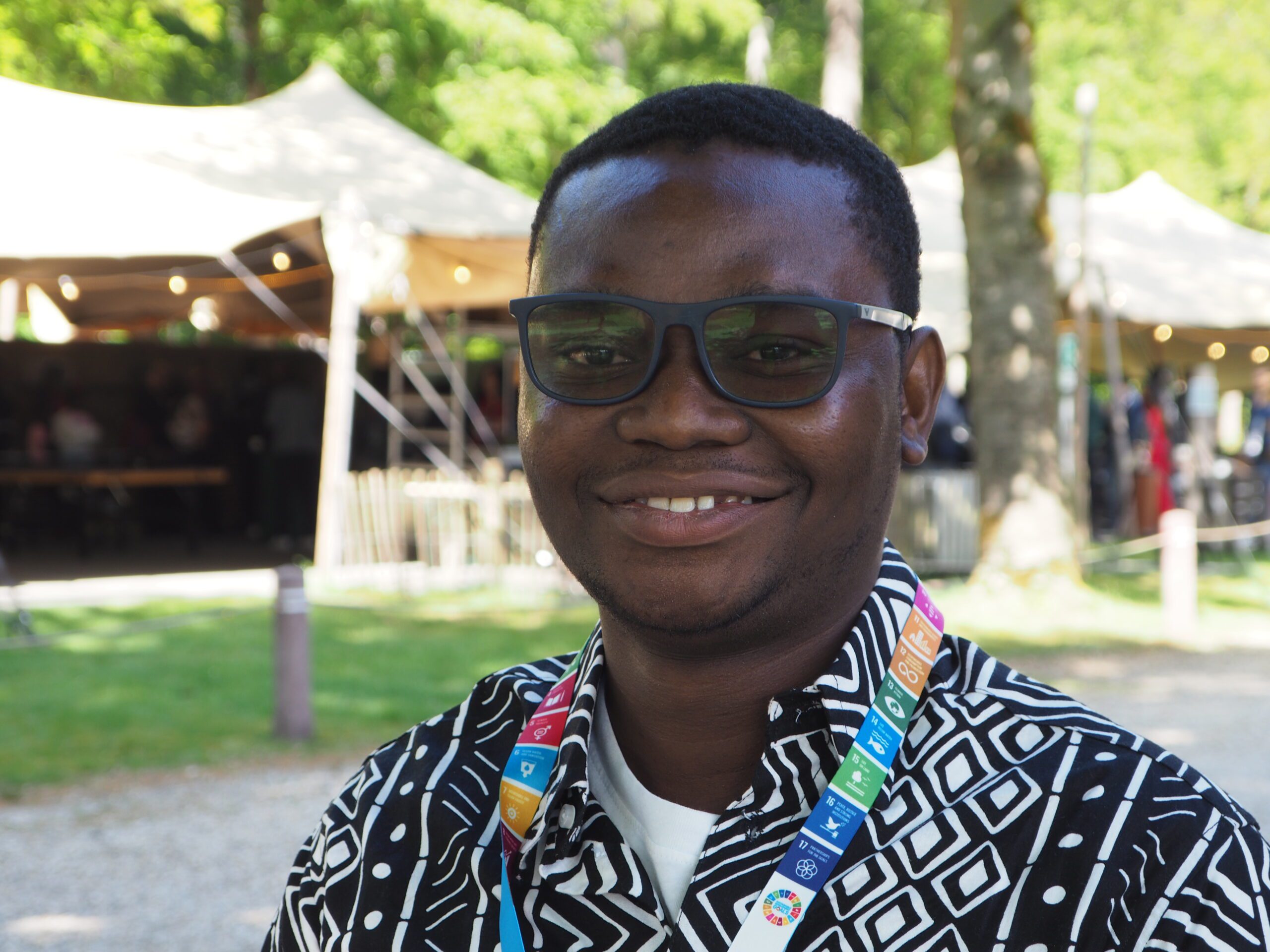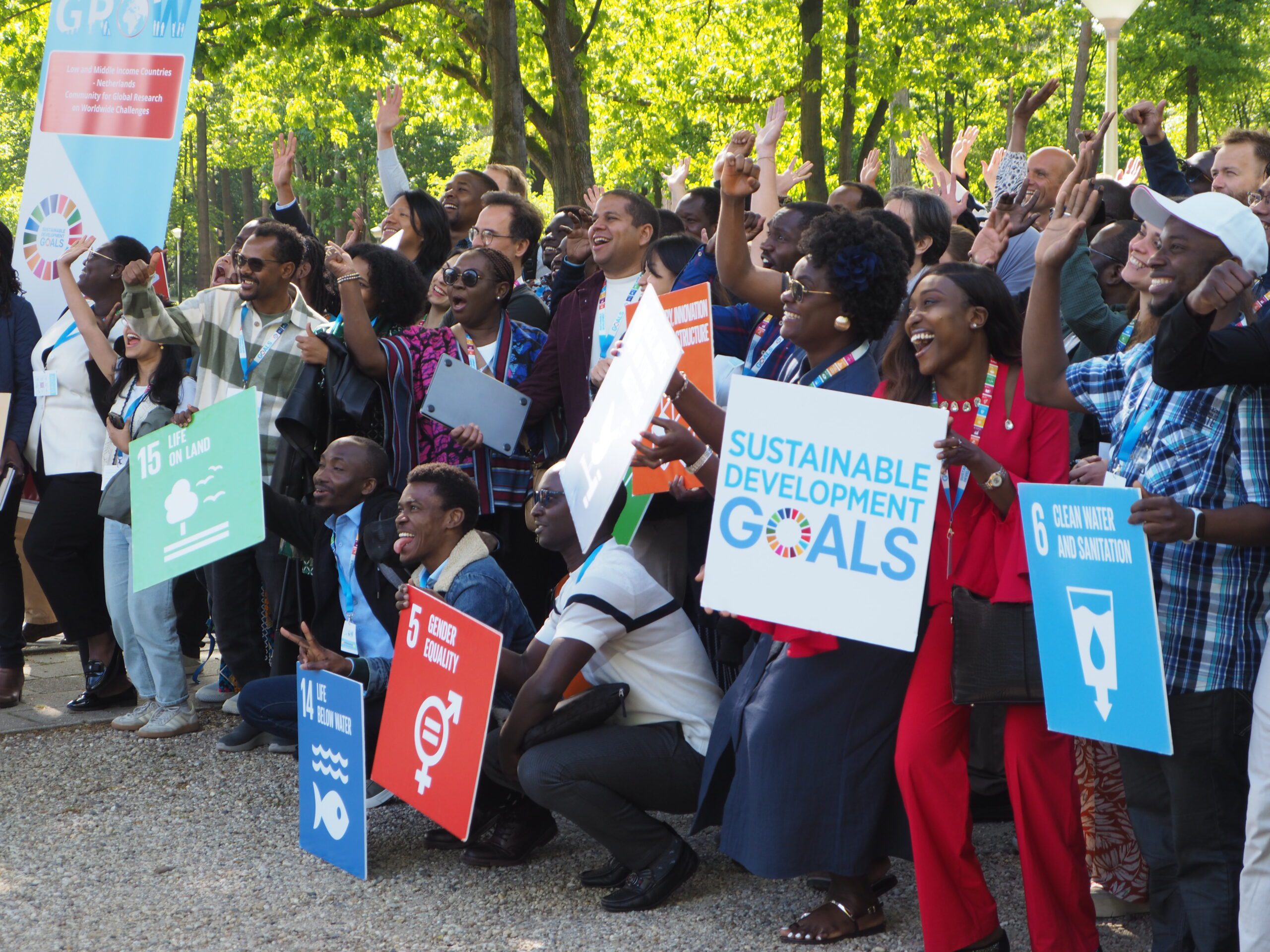Out of 2,400 applications from African academics, 51 were admitted as PhD candidates on a Dutch university. 24 of them have come to Delft. Last week, these participants on the GROW programme met up in Elspeet.
The GROW event in Elspeet brought together 51 African PhD students and their supervisors (Photo: Jos Wassink).
Hotel Mennorode in the Veluwe exudes the typical tranquillity of a conference retreat. The only sounds in the morning are birds chirping and singing. A few people stroll quietly along the raked paths. In the middle of the spacious grounds stands a tent where people meet, sip cappuccinos, and scroll through their laptops.
“It’s an oasis,” says Dina AbuBakr. “Like the rest of the Netherlands – everything’s so green here.” She graduated in Sudan as a biomechanical engineer.
“It’s amazing to be here,” says Josué ‘Rock’ Segnon from Benin, an electrical engineer. “Not just for the opportunity to pursue a PhD, but also because of the interdisciplinary network.”

Floodings Caused by Plastic
The Ocean Cleanup is well known, but for Nigerian hydraulic engineer Michael Ogunyemi, the issue of floating plastic is much closer to home. He sees plastic piling up in canals and rivers, blocking bridges and culverts. This leads to flooding and, in some cases, bridges may even collapse.
As part of his PhD in the Hydraulic Engineering group (Faculty of Civil Engineering and Geosciences), he wants to develop solutions for plastic build-up around vulnerable infrastructure.
He’s glad to be part of the GROW programme. “It’s not just about the PhD – it’s a way to drive change. Here, people from the countries themselves are taught the skills to tackle the problems.”
Ogunyemi believes that TU Delft offers goal-oriented training that helps independent researchers develop. By the end of his PhD, he hopes to combine research and design on practical applications. “How I can use physics to address real-world problems is the idea.”
PhD supervisors: Prof. Wim Uijttewaal and Dr Davide Wüthrich
SDG’s: 6 – clean water and sanitation; 13- climate action.
Sustainable Development
GROW stands for Global Research On Worldwide challenges. It’s a network of Dutch universities, led by TU Delft, that trains researchers working on the United Nations Sustainable Development Goals (SDGs). The term GROWinResearch is also used for this programme.
GROW invited talented graduates from low- and middle-income countries (LMICs, formerly known as ‘developing countries’) in Africa. Other continents remain out of the picture so far. Applicants could win a fully paid four-year PhD track at one of the member universities. . TU Delft is the largest contributor, hosting 24 of the 51 PhD candidates.
Applicants submitted their research proposals addressing one or more SDGs. They also needed to indicate where they wanted to carry out their research.
Selection
“We started this process in 2023,” says Claire Hallewas, the TU Delft Global Director. “It’s inspiring to see that now, at the third annual GROW event, the selected African candidates are actually here.”
Roel Kamerling, Programme Developer at TU Delft Global, explains how the 2,400 applications were carefully reviewed over an extended period by staff from the six universities. In addition to motivation, academic level, and practical feasibility, candidates also needed a match with a prospective supervisor.
GROW emphasizes ‘the three Is’: interdisciplinary, international, and intersectoral (academic, government, NGOs, and business). The programme lead believes that this 3I combination improves the chances of research being applied in practice and furthering the development goals.

Training Dummy for Gynaecologists
Dina AbuBakr describes herself as a passionate biomedical engineer striving to improve healthcare for underserved populations. At the Biomedical Engineering group at the Faculty of Mechanical Engineering, she wants to develop a training dummy for gynaecologists and midwives.
“Especially in the second stage of labour, when the cervix is fully dilated, is when things often go wrong.” It’s not just about performing caesareans, she explains, but learning how to avoid them where possible.
As a biomedical engineer, she sees herself as a bridge between medical professionals and engineers. “Medical education is always too short and overcrowded for hands-on training. That’s why we want to develop the training dummy.” Existing models cost thousands of euros and are out of reach for LMICs. Instead, AbuBakr wants to use 3D printers, which are already available in many African hospitals.
She calls the GROW programme a dream come true. While in Sudan, she dreamt of making a difference in the world but didn’t know how. Now she sees that chance – by helping improve medical training. “If they’re better prepared, they won’t make mistakes that harm people.”
PhD supervisors: Prof. Jenny Dankelman and Dr Roos Oosting
SDG’s: 3 – good health & wellbeing; 5 – gender equality; 17 – partnership for goals
Delft Global
The TU Delft Global Initiative, as TU Delft Global is formally known, is older and broader in scope than the GROW programme. For over 10 years, it has brought together TU Delft researchers and PhD candidates working on challenges faced by communities in sub-Saharan Africa and South and South East Asia.
It’s no surprise that TU Delft Global is leading the GROW programme. Other universities do not have a centralised office for international knowledge development, often charging coordination tasks to individual staff members.
GROW is funded by both Dutch and European sources. From the EU, the Marie Skłodowska-Curie Actions (MSCA) covered half the funding and the universities provided the rest. Funding for the annual GROW event comes from the Dutch National Science Agenda (NWA), specifically from its SDG track 23 for inclusive global development through the Dutch Research Council (NWO).

Electric Mobility
Josué ‘Rock’ Segnon from Benin is working on electric transport and mobility in west Africa. Electric scooters are more and more common, Rock says, but buses, which provide 70 percent of transportation, still mostly run on diesel. The plan is to electrify those as well. “We want to develop a low-carbon energy system capable of supporting the growth of electric mobility.” At the Energy & Industry research group at the Faculty of Technology, Policy & Management, Segnon wants to combine energy planning, modelling, and policy to create a viable transition plan for electric mobility. Smaller studies have already been carried out in Benin and Ghana.
Segnon is grateful for the opportunity to continue the work he had already started: bringing access to electricity to people. But there’s more. “My supervisors are genuinely interested in working with African researchers. There’s a growing community committed to developing solutions for urgent and complex issues on our continent.”
PhD supervisors: Prof. Machteld van den Broek and Dr Jaco Quist
SDG’s: 7 – affordable clean energy; 11 – sustainable cities and communities; 13 – climate action; 9 – industry, innovation and infrastructure
Intrinsic Motivation
Hydrologist Prof. Nick van de Giesen (Faculty of Civil Engineering and Geosciences) chairs the NWA Route 23 on SDGs. He also helped initiate collaboration between TU Delft and African researchers, laying the groundwork for TU Delft Global.
He attended the GROW event in the Veluwe and said that “Our approach to these meetings is to show how all the SDGs are connected. If you dig a well for water, it also impacts the local ecology and social environment.”
But academic research must have boundaries – you can’t do a PhD on the idea that everything is connected. “That’s why we bring researchers together once or twice a year to discuss links between the SDGs. It broadens their perspective.”
Van de Giesen and TU Delft Global remain pragmatic and flexible in seeking funding. While support for international knowledge development is declining in the Netherlands, the EU is deepening its ties with the African Union.
GROW aims to bring 50 African PhD candidates to the Netherlands each year. Funding for the PhD positions is currently the biggest bottleneck. Nevertheless, the goal of expanding the international knowledge network remains unchanged.
According to Van de Giesen, the international, interdisciplinary, and intersectoral community emerging through GROW is its true value. “These people are all intrinsically motivated,” he says. “They’re all clear on what they’re doing and why.”





Read more on:
- The GROW research programme
- The Marie Curie Sklodovska Action fund
- The UN’s 17 sustainable development goals (SDGs)
Do you have a question or comment about this article?
j.w.wassink@tudelft.nl


Comments are closed.